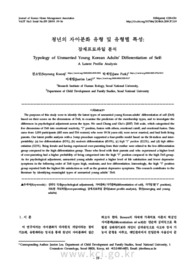

PARTNER
검증된 파트너 제휴사 자료
청년의 자아분화 유형 및 유형별 특성: 잠재프로파일 분석 (Typology of Unmarried Young Korean Adults’ Differentiation of Self: A Latent Profile Analysis)
18 페이지
최초등록일 2025.05.11
최종저작일
2019.09

-
미리보기
서지정보
· 발행기관 : 가정과삶의질학회
· 수록지 정보 : 가정과삶의질연구 / 37권 / 3호 / 19 ~ 36페이지
· 저자명 : 권소영, 박제인, 이재림
초록
The purposes of this study were to identify the latent types of unmarried young Korean adults’ differentiation of self (DoS) based on their scores on the dimensions of DoS, to examine the predictors of the membership types, and to investigate the differences in psychological adjustment across the types. We used Chung and Cho’s (2007) DoS scale, which categorized the five dimensions of DoS into emotional reactivity, “I” position, fusion with others, emotional cutoff, and emotional fusion. Data came from 1,019 participants (483 men and 536 women) who were 19-34 years old, were never married, and had both living parents. Our latent profile analysis with a 3-step procedure supported a four-profile model based on the fit-indices and interpretability: (a) low differentiation (9.5%), (b) moderate differentiation (65.9%), (c) high “I” position (12.2%), and (d) high differentiation (12.3%). Being female and having experienced over-parenting from their mother were related to the low differentiation group compared to the high differentiation group. Those who lived with their parents and who experienced a higher level of over-parenting had a higher probability of being categorized into the high “I” position compared to the high DoS group. As for psychological adjustment, unmarried young adults reported a higher level of life satisfaction and fewer depressive symptoms in the following order of DoS types: high, moderate, and low differentiation. Interestingly, the high “I” position group reported both the highest life satisfaction as well as the greatest depressive symptoms. This research contributes to the literature by identifying meaningful types of unmarried young adults’ DoS.영어초록
The purposes of this study were to identify the latent types of unmarried young Korean adults’ differentiation of self (DoS) based on their scores on the dimensions of DoS, to examine the predictors of the membership types, and to investigate the differences in psychological adjustment across the types. We used Chung and Cho’s (2007) DoS scale, which categorized the five dimensions of DoS into emotional reactivity, “I” position, fusion with others, emotional cutoff, and emotional fusion. Data came from 1,019 participants (483 men and 536 women) who were 19-34 years old, were never married, and had both living parents. Our latent profile analysis with a 3-step procedure supported a four-profile model based on the fit-indices and interpretability: (a) low differentiation (9.5%), (b) moderate differentiation (65.9%), (c) high “I” position (12.2%), and (d) high differentiation (12.3%). Being female and having experienced over-parenting from their mother were related to the low differentiation group compared to the high differentiation group. Those who lived with their parents and who experienced a higher level of over-parenting had a higher probability of being categorized into the high “I” position compared to the high DoS group. As for psychological adjustment, unmarried young adults reported a higher level of life satisfaction and fewer depressive symptoms in the following order of DoS types: high, moderate, and low differentiation. Interestingly, the high “I” position group reported both the highest life satisfaction as well as the greatest depressive symptoms. This research contributes to the literature by identifying meaningful types of unmarried young adults’ DoS.참고자료
· 없음태그
-
자주묻는질문의 답변을 확인해 주세요

꼭 알아주세요
-
자료의 정보 및 내용의 진실성에 대하여 해피캠퍼스는 보증하지 않으며, 해당 정보 및 게시물 저작권과 기타 법적 책임은 자료 등록자에게 있습니다.
자료 및 게시물 내용의 불법적 이용, 무단 전재∙배포는 금지되어 있습니다.
저작권침해, 명예훼손 등 분쟁 요소 발견 시 고객센터의 저작권침해 신고센터를 이용해 주시기 바랍니다. -
해피캠퍼스는 구매자와 판매자 모두가 만족하는 서비스가 되도록 노력하고 있으며, 아래의 4가지 자료환불 조건을 꼭 확인해주시기 바랍니다.
파일오류 중복자료 저작권 없음 설명과 실제 내용 불일치 파일의 다운로드가 제대로 되지 않거나 파일형식에 맞는 프로그램으로 정상 작동하지 않는 경우 다른 자료와 70% 이상 내용이 일치하는 경우 (중복임을 확인할 수 있는 근거 필요함) 인터넷의 다른 사이트, 연구기관, 학교, 서적 등의 자료를 도용한 경우 자료의 설명과 실제 자료의 내용이 일치하지 않는 경우
“가정과삶의질연구”의 다른 논문도 확인해 보세요!
-
보육교사의 일·생활균형, 직무스트레스, 직무만족, 소진과 영유아 학대인식 간의 구조적 관계: 혼인여부에 따른 집단분석을 중심으.. 17 페이지
The purpose of this study was to explore the structural causal relationships among childcare teachers’ work-life balance, job stress, job satisfaction, burnout, and awareness of infant abuse focusing .. -
보육교사 발달단계 및 직무만족도가 소진에 미치는 영향 11 페이지
The purpose of this study was to investigate the effects of childhood teachers' development stage and job satisfaction on burnout, to understand the characteristics of childcare teachers' developmenta.. -
성인기 초기 남성 동성애자의 성적 지향성 인지와 커밍아웃 경험 18 페이지
This study aims to analyze the recognition of sexual orientations and to find out the coming out experience of sexual minorities who are at the center of social issues and controversies today. With th.. -
학령기 아동의 그릿, 성장 마인드셋, 기본심리욕구, 부모의 긍정적 양육태도 간의 관계 구조분석 14 페이지
The purpose of the present study was to investigate structural relationships among the related variables of school-age children’s GRIT. The participants in this study were 1,000 5th and the 6th grade .. -
유아기 자녀를 둔 어머니가 지각한 아버지의 양육참여와 어머니의 문지기 역할 간 관계: 어머니의 양육 스트레스와 부부갈등의 매개.. 11 페이지
The purpose of this research was to examine the mediating effects of child rearing stress and marital conflict as it influences child rearing participation by the father as perceived by the mother in ..
문서 초안을 생성해주는 EasyAI
